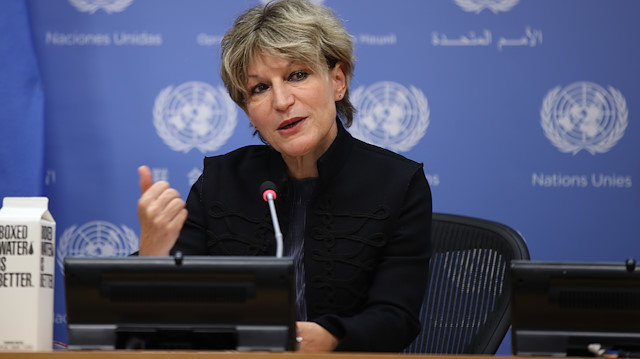
UN investigator Agnes Callamard says she is aware of problems, but at some point, we have to confront the challenge
The prosecution of foreign Daesh/ISIS fighters in their countries of origin is the “only option,” said a UN human rights expert, citing the lack of fair trials in the countries where they are being held.
In an interview with Anadolu Agency at UN headquarters, Agnes Callamard, the UN special rapporteur on extrajudicial, summary or arbitrary executions, said there are currently no conditions in Iraq or Syria for the delivery of justice and fair trials cannot be guaranteed there.
“This is why, in my view, the only option at the moment is for the trials to be held elsewhere. The countries of origin of foreign fighters are the most logical places,” said Callamard, adding the region lacks a process that meets global standards for transitional justice.
“Of course, we could imagine an ad hoc tribunal and hybrid tribunal of an international nature. This is going to take a long time to put in place," she added.
Some 2,000 foreign fighters, including their spouses and children, are currently at camps in northeastern Syria, 800 of whom are believed to be from European countries.
Among them, Callamard said, are those who “had nothing to do with the fight, who may have been there as a companion, wife or husband of a fighter.”
She said those individuals should be checked and returned to their countries of origin.
“The orphans should be returned as a matter of priority,” said Callamard. “There is no reason why those orphans should still be left in camps in northeast Syria when their grandparents are expecting and asking for them back in their countries of origin.”
- Violation of rights
Turning to the stripping of foreign fighters’ citizenship by their home countries, Callamard called the move a violation of rights and international law.
“A large number of international obligations are being violated when foreign fighters are stripped of their nationalities,” she said.
Callamard said she has long advocated for returning foreign fighters to be held accountable and tried in their countries of origin, adding she is aware of the difficulties of prosecuting them in their home countries.
“I know it is not easy. I know there are many difficulties and many fears associated with that, including fears that they could use their return as a platform for further propaganda and radicalization,” she said. “I am fully aware of those problems.”
She said the international community should be prepared to build or strengthen democratic institutions to handle that challenge.
“There is no easy solution... Just because we are not living in the northeast of Syria, it is not going to go away...At some point, we have to confront it,” she concluded.
The U.S. has repeatedly called on European countries to take back their nationals who fought for Daesh/ISIS and prosecute them, but they have refused to do so.
*Servet Gunerigok in Washington contributed to the story
Hello, the comments you share on our site are a valuable resource for other users. Please respect other users and different opinions. Do not use rude, offensive, derogatory, or discriminatory language.
The floor is all yours.


